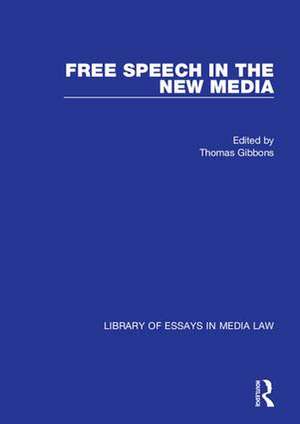Free Speech in the New Media: Library of Essays in Media Law
Editat de Thomas Gibbonsen Limba Engleză Hardback – 11 sep 2009
Preț: 1699.48 lei
Preț vechi: 2280.68 lei
-25% Nou
Puncte Express: 2549
Preț estimativ în valută:
325.28€ • 338.30$ • 272.58£
325.28€ • 338.30$ • 272.58£
Comandă specială
Livrare economică 20 februarie-06 martie
Doresc să fiu notificat când acest titlu va fi disponibil:
Se trimite...
Preluare comenzi: 021 569.72.76
Specificații
ISBN-13: 9780754627913
ISBN-10: 0754627918
Pagini: 582
Dimensiuni: 169 x 244 x 42 mm
Greutate: 1.38 kg
Ediția:1
Editura: Taylor & Francis
Colecția Routledge
Seria Library of Essays in Media Law
Locul publicării:Oxford, United Kingdom
ISBN-10: 0754627918
Pagini: 582
Dimensiuni: 169 x 244 x 42 mm
Greutate: 1.38 kg
Ediția:1
Editura: Taylor & Francis
Colecția Routledge
Seria Library of Essays in Media Law
Locul publicării:Oxford, United Kingdom
Cuprins
Contents: Introduction; Part I Free Speech and Converged Media: Freedom of the press and public access: toward a theory of partial regulation of the mass media, Lee C. Bollinger; Broadcasting and speech, Jonathan Weinberg; Converging 1st Amendment principles for converging communications media, Thomas G. Krattenmaker and L.A. Powe Jr; Digital speech and democratic culture: a theory of freedom of expression for the information society, Jack M. Balkin; Media freedom and political debate in the digital era, Jacob Rowbottom. Part II Public Service Broadcasting: Culture and consumerism: citizenship, public service broadcasting and the BBC's fair trading obligations, Georgina Born and Tony Prosser; European controls on member state promotion and regulation of public service broadcasting and broadcasting standards, Mike Varney; A marketplace approach to broadcast regulation, Mark S. Fowler and Daniel L. Brenner. Part III Content Standards: a) Beliefs: You can't say 'God' on the radio: freedom of expression, religious advertising and the broadcast media after Murphy v. Ireland, Andrew Geddis; 'A monstrous and unjustifiable infringement'? Political expression and the broadcasting ban on advocacy advertising, Andrew Scott; b) Indecency: The newness of new technology, Monroe E. Price; Beyond Madison? The US Supreme Court and the regulation of sexually explicit expression, Ian Cram; c) Content Regulation in the European Community: The revised television without frontiers directive: is it fit for the next century?, Berend Jan Drijber; Media convergence and the regulation of audiovisual content: is the European Community's Audio visual Media Services Directive fit for purpose? Rachel Craufurd Smith; d) Advertising: The value of commercial speech, Colin R. Munro; Name index.
Recenzii
'This collection provides an insight into how the logic of the new media will ultimately compel the law.' Law Society Journal
Notă biografică
Thomas Gibbons is a Professor in the Department of Law at the University of Manchester, UK
Descriere
The essays in this volume consider questions of political and constitutional principle and theory that affect the law and regulation of content in new media that are based on digital technology. They examine a range of issues such as whether the justifications for government intervention in traditional analogue broadcasting and programme delivery continue to be persuasive; whether new approaches to freedom of expression are required in the digital era; whether there is a continued role for public service broadcasting or its equivalent and whether there is a case for the European Union's measures to secure 'Television without Frontiers'.


